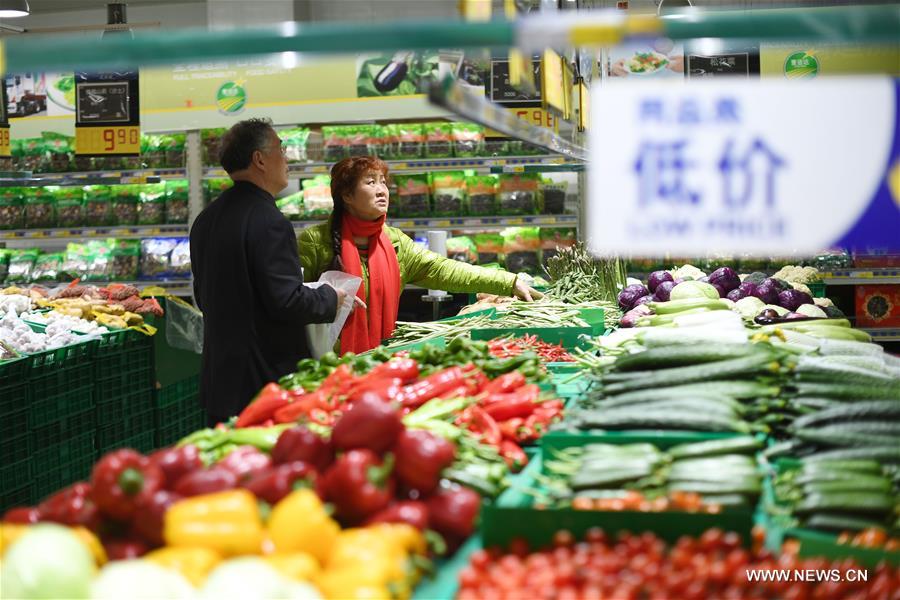

 |
| Consumers select vegetables at a supermarket in Wuhan, capital of central China's Hubei Province, March 9, 2017. China's consumer price index (CPI), a main gauge of inflation, advanced 0.8 percent year on year in February, the National Bureau of Statistics (NBS) said Thursday. It was well below market expectation of 1.7 percent, and substantially lower than the growth of 2.5 percent in January. On a monthly basis, the CPI declined 0.2 percent. (Xinhua/Xiong Qi) |
BEIJING, March 20 -- A slower but more sustainable Chinese economy will be good for China and better for the rest of the world.
The world economy has been in a low-growth trap for five years, as persistent growth shortfalls have weighed on future output expectations while widening productivity gaps contributed to rising inequality.
Speaking in Beijing over the weekend, Gabriela Ramos, Chief of Staff of the Organization for Economic Cooperation and Development (OECD), explained that the challenges facing the world economy are particularly thorny and beyond her expectations.
China has lowered its 2017 growth target to around 6.5 percent, the lowest in more than two decades, described as "realistic and in keeping with economic principles."
China's sociopolitical stability and economic dynamism will continue as slower but more sustainable growth trajectory is backed by consistent efforts to address structural problems.
China, once known as the "kingdom of bicycles," now has more than two million brightly colored new bikes on the road, unlocked by mobile apps and tracked by GPS.
Small wonder that China leads the world in bike-sharing considering the number of consumers, but the current bicycle-mania draws together all the key elements of China's new growth model: Internet technology, a vast market and environmentally friendliness.
China's new pattern is underpinned by its emergence as a manufacturer of the state-of-the-art robots and drones rather than shoddy plastic goods and toys.
With lavish state spending on R&D and human resources, China is moving up the global value chain, with positive forces building up during the transitioning from slower to sustained growth.
China's rising economic might is not at the expense of other countries, but is based on shared prosperity with the rest of the world.
In an anemic global economy, Michael Spence, a Nobel laureate in economics, calls China the "single most important growth engine of the global economy."
American auto-maker Tesla is proud of its success in China. Sales have doubled from three years ago when the electric car-maker came to China. China is now the fastest growing and the most important market for Tesla.
Apple plans to open two more R&D centers in Shanghai and Suzhou following its success in Beijing and Shenzhen. "Look at the talent in China, it is just amazing... We want to broaden our cooperation with China in a deeper way," said Apple CEO Tim Cook.
Over the next five years, China will import goods worth around 8 trillion U.S. dollars. Inbound and outbound investment should hit 600 billion and 750 billion U.S. dollars.
No matter whether populism, conservatism and protectionism raise their heads or not, China has opened its door to the world and the door will open wider.
While China remains cautious, multilateral agencies have upgraded their projections. The IMF and the OECD have raised their forecasts on China's growth to 6.5 percent for 2017.
Agencies warn however of deeper problems if runaway debt and financial irregularities go unchecked, but China's new strategy leaves plenty of scope to address these risks.

 Award-winning photos show poverty reduction achievements in NE China's Jilin province
Award-winning photos show poverty reduction achievements in NE China's Jilin province People dance to greet advent of New Year in Ameiqituo Town, Guizhou
People dance to greet advent of New Year in Ameiqituo Town, Guizhou Fire brigade in Shanghai holds group wedding
Fire brigade in Shanghai holds group wedding Tourists enjoy ice sculptures in Datan Town, north China
Tourists enjoy ice sculptures in Datan Town, north China Sunset scenery of Dayan Pagoda in Xi'an
Sunset scenery of Dayan Pagoda in Xi'an Tourists have fun at scenic spot in Nanlong Town, NW China
Tourists have fun at scenic spot in Nanlong Town, NW China Harbin attracts tourists by making best use of ice in winter
Harbin attracts tourists by making best use of ice in winter In pics: FIS Alpine Ski Women's World Cup Slalom
In pics: FIS Alpine Ski Women's World Cup Slalom Black-necked cranes rest at reservoir in Lhunzhub County, Lhasa
Black-necked cranes rest at reservoir in Lhunzhub County, Lhasa China's FAST telescope will be available to foreign scientists in April
China's FAST telescope will be available to foreign scientists in April